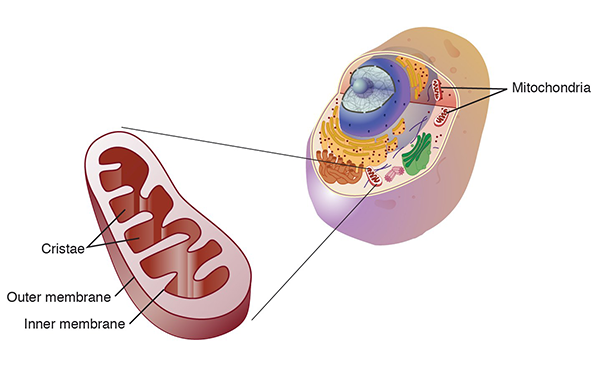It seems like everyone is tired. Many of us are overcommitted, we don’t get enough sleep, we are stressed, and maybe we don’t eat the best either. Fatigue is beyond feeling tired. Most of the time if you are tired, and you get some good sleep, you will feel better. This isn’t always the case with fatigue.
Fatigue can feel like more than just being tired. It can feel like being overwhelmed, poor concentration, frustration, anxiety, depression, pain or brain fog. There can be many underlying causes as well.
If you have been feeling overly tired despite adequate sleep, reduced stress, healthy eating and adequate hydration, please see your health care provider.
Quick Biology Lesson: Mitochondria
Inside our cells we have little engines called mitochondria. Our mitochondria take the products from broken down food and other things to produce energy, or ATP. The more ATP our bodies produce, the more energy our cells have to do their jobs. Really, the main focus of mitochondria is to support energy production.
Fatigue is more than just being #tired. Discover how the foods you choose can impact your bodies ability to produce energy. #saslife Click To TweetGeneral Recommendations to Optimize Energy Levels
- Adequate hydration – even slight dehydration can cause a drop in energy levels (a drop in ATP production). Aim for at least ½ of your body weight (in pounds) in ounces of water. For example, if you weigh 180 pounds, drink at least 90oz of water throughout the day.
- Maintain healthy glucose levels throughout the day – eat protein, healthy fats and unprocessed carbs at each meal and avoid excessive added sugars and processed carbs. When your glucose levels spike and crash, you can feel very tired, either after meals, or all day long.
- Move your body – our bodies are meant to move. When you are sedentary, there is a reduced production of ATP. Taking small movement breaks during the day is a great place to start.
- Get adequate sleep – prioritize your sleep and aim for 6-9 hours per night. Inadequate sleep can reduce ATP production.
Beyond the General Recommendations
Remember, supporting mitochondria plays a huge role in supporting energy levels. If you feel like you have done all of the general recommendations above, but still feel tired, or fatigued, think about the following.
There can be two types of fatigue:
- Peripheral fatigue, which is literally not enough ATP.
- Central fatigue, which is more of a neurotransmitter related issue, or perceived fatigue.
Both can be impacted by diet and lifestyle. Central fatigue can greatly be benefited by Cognitive Behavioral Therapy.
There are ways to increase the amount of mitochondria in your cells, this is called mitochondrial biogenesis. These things can include exercise, cold exposure (like a cold shower), heat exposure (like a sauna), and light therapy (NIR (near infrared light), sunlight).
On the flip side, certain diet or lifestyle habits that can decrease mitochondria in your cells include overeating, refined carbohydrates, inflammation, and inactivity (being sedentary).
Nutrition Specifics
To support mitochondrial function and energy levels, consume a nutrient dense, anti-inflammatory diet high in antioxidants.
- Aim for 8-10 servings of a colorful variety of fruits and vegetables each day. The phytonutrients in plant foods have strong antioxidant and anti-inflammatory properties. Beans and lentils and herbs and spices are also great sources of phytonutrients.
- Have at least 2-3 servings per week of omega-3 rich fatty fish like salmon, sardines, mackerel and herring. Omega-3 fatty acids are very potent anti-inflammatories.
- Choose a variety of nutrient dense, real, whole foods. There are many nutrients that are required for optimal mitochondrial function. Speak with your dietitian if you have any food limitations that might result in nutrient deficiencies, and have your provider check for deficiencies in nutrients such as vitamins B12 and D.
- Limit or avoid alcohol. Alcohol is a toxin and directly impairs mitochondrial function.
Again, if you have been feeling overly tired despite adequate sleep, reduced stress, healthy eating and adequate hydration, please see your health care provider.
Simple Vegetable Soup
Adapted from Minimalist Baker
Make 6 Servings
PRINT RECIPE
Ingredients
1 large leek, halved lengthwise, cut into ¼-inch slices (or sub 1 small onion, finely diced)
2 Tbsp olive or avocado oil
3 small carrots, finely diced
4 stalks celery, finely diced
2 cups shredded green cabbage
3 large cloves garlic, minced or pressed
½ tsp each sea salt and black pepper (or to taste)
1 tsp dried Italian herbs (or sub dried basil, oregano, and/or rosemary)
1 (14.5 oz) can diced tomatoes
1 (15 oz) can cannellini beans, drained and rinsed (any white bean works, as do pinto beans or chickpeas)
1 (15 oz) can lentils, drained and rinsed (or sub more beans)
8 cups vegetable or chicken broth or bone broth
1 bunch kale/chard/spinach, chopped into bite-size pieces
Instructions
- Remove the root end and dark green part of the leek and discard. Slice the white and light green part of the leek in half lengthwise and clean by running cold water over each half, getting in between the leaves to remove any dirt. Then slice into ¼-inch slices.
- In a large pot or Dutch oven, heat the oil over medium-low heat. Once hot, add the leek and cook until softened and translucent — about 2 minutes. Add the carrots, celery, cabbage, garlic, salt, and pepper, and cook until softened and fragrant, stirring occasionally — about 4-5 minutes.
- Add the Italian herbs and stir to combine. Then add the tomatoes, drained and rinsed beans, lentils, and broth. Stir well, making sure nothing is stuck to the bottom, and bring to a boil. Once boiling, reduce the heat to low, cover, and simmer for 15-20 minutes or everything is fork-tender and the flavors have melded.
- Stir in the greens, then cover and simmer until the greens are tender — about 5 minutes.
- Leftovers keep in the refrigerator for 3-4 days or in the freezer for up to 1 month. Flavors get better with time!






